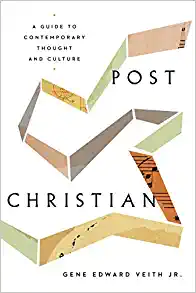
Gene Edward Veith, Jr.
Reviewed by: Mike Myers
Post-Christian: A Guide to Contemporary Thought and Culture, by Gene Edward Veith Jr. Crossway, 2020. Paperback, 320 pages, $19.46 (Amazon). Review by OP pastor Mike Myers.
Gene Edward Veith wrote Post-Christian as a sequel to his 1994 work Postmodern Times. The book contains reflection and analysis upon philosophical, anthropological, social, and religious developments over the three intervening decades. Before touching on just some of the content matter of this book, I offer this general description. Carl Trueman’s recent tome The Rise and Triumph of the Modern Self identifies many of the philosophical underpinnings responsible for driving our society to its present condition. Post-Christian takes many of those abstract concepts that Trueman helpfully identified and shows how they are coming into expression in our day. These two volumes complement one another well. In fact, if the reader is daunted by the density of philosophy from Trueman, Veith’s book will explain what the results look like without extensive examination of how those results came to be. Regarding the title, Veith does not argue that Christianity has come to an end. Rather, he endeavors to discuss “what we are left with when we try to abandon the Christian worldview” (18).
Post-Christian stands to be of help to many within the OPC. Veith matter-of-factly introduces his readers to an array of categories and concepts about which there is much naivety and/or ignorance in the church. For instance, he discusses the subject of transhumanism in chapter 6. This concept refers to melding humans with machines and technology in an attempt to transcend the natural limitations of humanity. He also addresses the increasing prevalence and moral problems with things like sperm donation (150), pornography, sex robots (111–112), genetic engineering (116–124), and even artificial wombs (124). These words and concepts may shock and even offend readers of New Horizons. However, this world in which we live resembles the degeneracy of Sodom more and more. Christians—and especially elders within the church—must at the very least be aware of these issues. While we pray and work for reformation of the church and the good of the places in which we live (Jer. 29:7), we also need to know that these movements and developments will pose serious questions and even threats to biblical Christianity. God’s people must seek to be as wise as serpents in the midst of wolves (Matt. 10:16).
Veith also offers insightful criticisms of feminism and the sexual revolution. He rightly connects feminism to the homosexual and transsexual movements. Regarding transgenderism, he explains how it actually destroys what many have claimed the goals of feminism are: “But once males and females are fully interchangeable, feminism too ceases to exist” (147). Another strength of Veith’s work is how he applies the Word of God to these various challenges of our day. In his discussion about artificial intelligence and “singularity” (256–266), Veith exposes the movement to be nothing other than technologically advanced idolatry. Citing from Isaiah 44:14–22, he clearly demonstrates how it will ultimately come to nothing.
Some of the observations Veith makes in Post-Christian sound dystopian and even frightening; many of the facts and statistics he presents are quite disheartening. However, he encourages Christian readers that they have no reason for despair. The bleakness of the “post-Christian world” stands in sharp contrast to the glory of the truth as it is in Jesus Christ. The books ends on this very theme: “The succession of ages and movements are all in his hands—premodern, modern, postmodern, post-Christian, postsecular, and whatever will come next” (307). As with everything, read with discernment, but I definitely recommend this work.
November 23, 2025
November 16, 2025
November 09, 2025
November 02, 2025
October 26, 2025
October 19, 2025
October 05, 2025
Raising Sexually Faithful Kids and
Parenting Boys and Girls in a Gender-Confused World
© 2025 The Orthodox Presbyterian Church